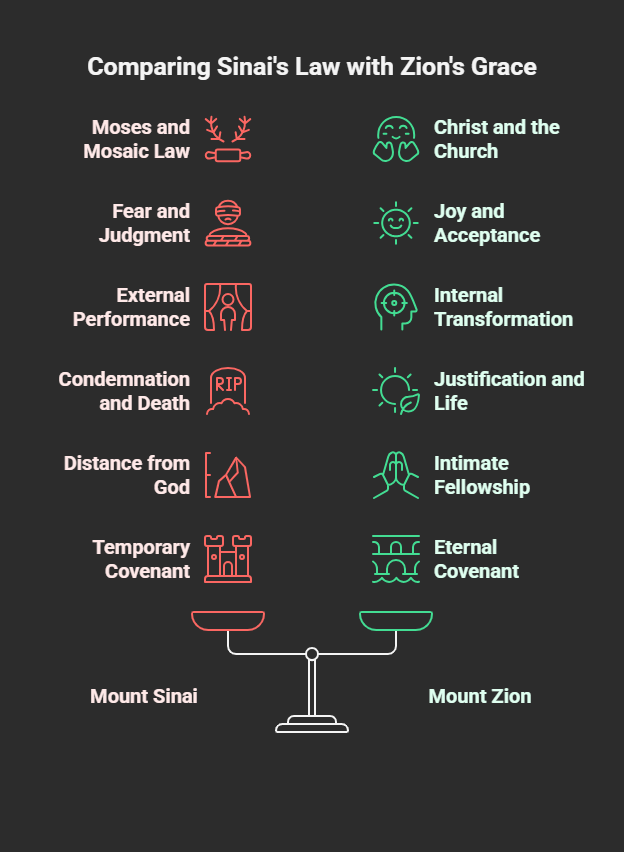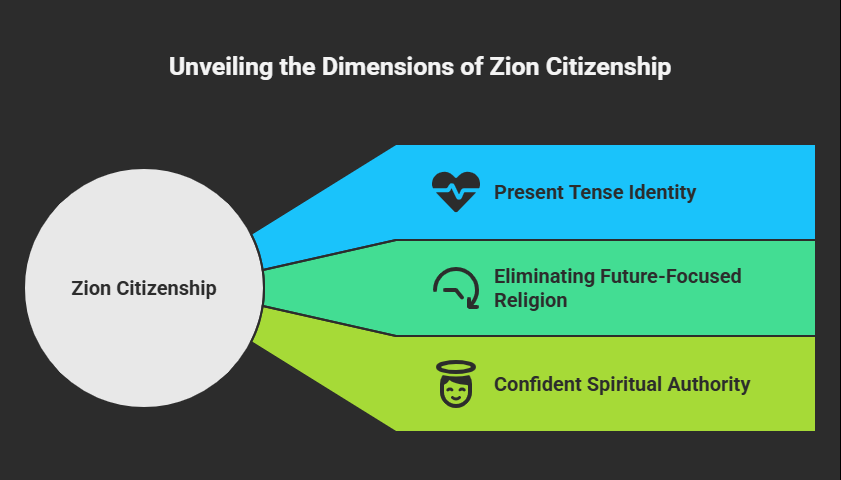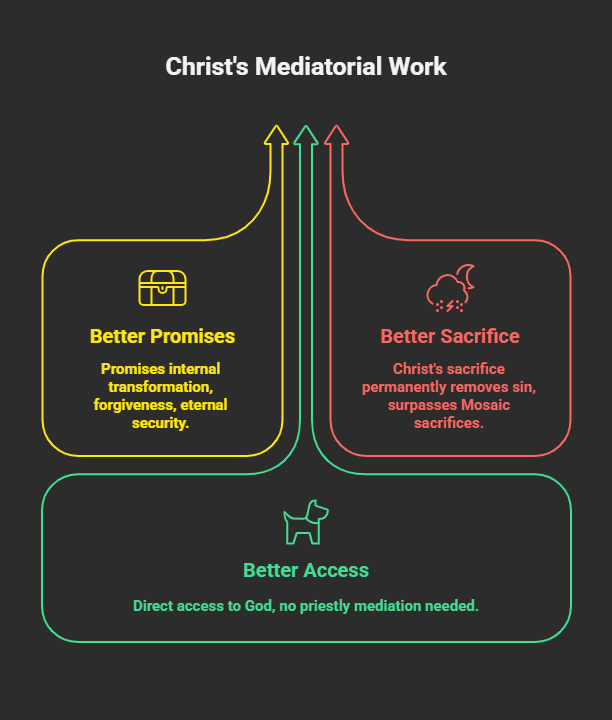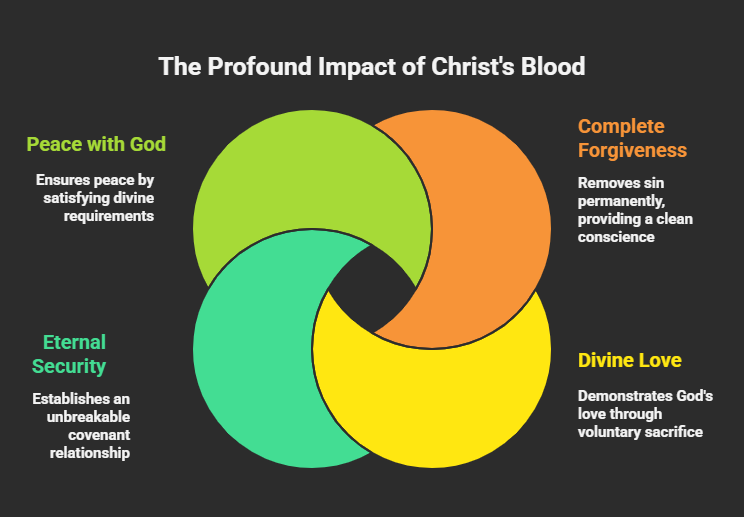The book of Hebrews stands as one of Christianity’s most profound theological treasures, rich with transformative truth regarding the person of Christ.
This remarkable epistle presents Jesus as the ultimate fulfillment of God’s revelations through the prophets, establishing His unparalleled supremacy and all-sufficient capacity as both Redeemer and Mediator of divine grace.
Throughout its pages, the book of Hebrews unveils the various offices of Jesus while offering profound promises that believers cherish across generations.
Among these magnificent revelations, the verses found in Hebrews 12:22-24 shine with particular brilliance, revealing truths that fundamentally transform how believers understand their spiritual identity and present reality.
In this bible study guide, we will examine three crucial aspects that emerge from this pivotal passage:
- The symbolic meaning and spiritual significance of Mount Zion
- Understanding our present citizenship in Mount Zion
- Profound lessons we can glean from the mediatorial work revealed in Hebrews 12:24
Understanding the Literary Context: Old Testament Shadows and New Testament Realities
A careful examination of Hebrews reveals the author’s masterful literary technique, skillfully weaving profound comparisons between Old and New Testament revelations.
The epistle appears to address Jewish Christians, likely residing in Rome, who faced significant temptations to abandon their faith in Christ and revert to traditional Judaism under persecution pressure.
The writer demonstrates comprehensive understanding of Old Testament sacrificial practices and celebrates the heroic faith of biblical figures including Abraham, Daniel, Noah, Enoch, Abel, Isaac, Sarah, Jacob, Moses, and Samson, among numerous others.
These spiritual giants established patterns of faith that pointed forward to superior spiritual realities fulfilled in Christ.
Despite their exemplary faith and remarkable spiritual achievements, the author makes a startling observation: these Old Testament saints yearned for a superior, more desirable homeland, and their spiritual perfection remained incomplete without us the “New Testament believers” (Hebrews 11:16, 40).
This profound statement raises an intriguing theological question that demands careful biblical examination: What was the country these revered Old Testament fsaints were anticipating?
What homeland captivated their spiritual imagination and motivated their earthly pilgrimage?
The Believers’ Present Reality: Understanding “You Have Come”
To answer this fundamental question, we turn to our key biblical text in Hebrews 12:22-23, which declares with breathtaking clarity:
“But ye are come unto mount Sion, and unto the city of the living God, the heavenly Jerusalem, and to an innumerable company of angels, to the general assembly and the church of the first born, which are written in heaven, and to God the judge of all, and to the spirit of just men made perfect” (KJV).
The Critical Importance of Spiritual Knowledge
Upon receiving salvation, every believer should prioritize acquiring not mere intellectual information but Christ-centered knowledge that produces abundant good works and transformed living.
Close attention to Scripture over time dramatically affects your faith development, for the Word declares that God’s people “perish for lack of knowledge,” while “by knowledge shall the just be delivered” (Hosea 4:6 and Proverbs 11:9).
Therefore, emphasizing the crucial role of accurate knowledge in every believer’s spiritual development remains absolutely essential for healthy Christian growth.
Everything believers do, say, or become after salvation depends entirely on the knowledge they possess in Christ.
This means the greatest pursuit of every believer following salvation involves acquiring precise, biblical knowledge of Christ’s person and work.
Having accurate knowledge of what Christ has accomplished in believers and for believers directly affects the songs they sing, the messages they preach, and the prayers they offer.
Present Tense Reality: “You Have Come”
The opening declaration in Hebrews 12:22 contains revolutionary grammatical significance that transforms believers’ understanding of their spiritual position.
The text doesn’t suggest believers are “marching toward Zion” or “trying to reach Zion” in some future spiritual journey.
Instead, it emphatically declares: “But ye are come to Mount Zion”—using present perfect tense that indicates completed action with ongoing results.
This grammatical construction reveals stunning spiritual reality: The believer has already arrived in Zion, and Zion represents the city of the Living God, the general assembly, and the church of the firstborn.
This isn’t wishful thinking or future hope—it’s present spiritual fact.
Mount Zion: The Believer’s Present Spiritual Address
Zion as Home Address
Here’s transformative news that revolutionizes your Christian identity: Zion currently serves as every believer’s spiritual home address.
Every person who experiences the new birth has entered Zion, which is synonymous with the church. This isn’t metaphorical language but literal spiritual geography.
Right now, at this very moment, every believer possesses legal and spiritual right to enjoy all the magnificent blessings associated with Zion citizenship.
This includes divine protection, heavenly provision, spiritual authority, and unrestricted access to God’s throne of grace. – Glory! hallelujah!
Universal Citizenship in Zion
All believers throughout history—past, present, and future—hold citizenship papers for Zion.
While physical bodies experience earthly birth in various geographical locations, the authentic spiritual identity (the regenerated human spirit) experiences birth in Zion.
Therefore, believers originate from Zion rather than merely traveling toward it.
This truth fundamentally alters how believers understand their identity, purpose, and daily spiritual experience.
Rather than spiritual pilgrims hoping someday to reach divine acceptance, believers currently enjoy complete spiritual citizenship with all accompanying privileges and responsibilities.
The Contrast: Mount Sinai versus Mount Zion

Biblical Comparison and Covenant Distinction
In developing this magnificent revelation, the author of Hebrews employs deliberate comparison between Mount Sinai and Mount Zion, echoing Paul’s similar contrast in Galatians 4:21-31.
This comparison illuminates the fundamental distinction between Old and New Covenant spiritual experiences.

Mount Sinai represents:
- Moses and the Mosaic Law
- Fear, trembling, and divine judgment
- External religious performance
- Condemnation and spiritual death
- Distance between God and humanity
- Temporary, earthly covenant arrangements
Mount Zion represents:
- Christ and the church
- Joy, celebration, and divine acceptance
- Internal heart transformation
- Justification and spiritual life
- Intimate fellowship with God
- Eternal, heavenly covenant realities
The Believer’s Position in Christ
Since believers exist “in Christ” through spiritual union accomplished by the new birth, they automatically dwell in Zion.
This spiritual geography isn’t future destination but present reality. Believers have already received divine grace and eternal life, establishing them as citizens of heaven with full legal standing before God’s throne.
Understanding this truth eliminates a fundamental error in contemporary Christian prayer and worship: requesting to “go to heaven” represents unnecessary petition since believers already possess heavenly citizenship.
This misunderstanding reflects incomplete knowledge of New Covenant spiritual realities.
Biblical Support for Present Heavenly Citizenship
Scripture provides overwhelming evidence for believers’ current heavenly citizenship status:
Philippians 3:20: “But our citizenship is in heaven. And we eagerly await a Saviour from there, the Lord Jesus Christ.” This verse employs present tense regarding citizenship while placing future hope in Christ’s physical return.
Ephesians 2:19: “Consequently, you are no longer foreigners and strangers, but fellow citizens with God’s people and also members of his household.” Believers currently enjoy citizenship status rather than working toward future acceptance.
Colossians 1:13: “For he has rescued us from the dominion of darkness and brought us into the kingdom of the Son he loves.” The verb tense indicates completed action—believers have already been transferred into Christ’s kingdom.
The Heavenly Jerusalem: Understanding Spiritual Geography
The City of the Living God
Hebrews 12:22 identifies Mount Zion with “the city of the living God, the heavenly Jerusalem.”
This isn’t poetic imagery but spiritual reality that defines believers’ current dwelling place. The heavenly Jerusalem represents the ultimate expression of divine community where God dwells among His people.
This heavenly city differs fundamentally from earthly Jerusalem, which served as shadow and type pointing forward to superior spiritual reality.
While earthly Jerusalem housed temporary temple worship, the heavenly Jerusalem provides eternal access to God’s presence through Christ’s mediatorial work.
Innumerable Company of Angels
The Believers’ spiritual citizenship in Mount Zion grants them fellowship with “an innumerable company of angels”—the vast angelic host that serves God and ministers to believers.
This isn’t future fellowship but present spiritual reality, though invisible to natural perception.
Angels currently surround believers with supernatural protection, deliver divine messages, and facilitate spiritual breakthroughs in response to prayer and faith.
Understanding this present angelic fellowship encourages believers during spiritual battles and challenging circumstances.
The General Assembly and Church of the Firstborn
The phrase “general assembly and church of the firstborn” describes the complete gathering of all believers throughout history who possess heavenly citizenship.
The Greek term “ekklesia” (church) indicates those “called out” from the worldly systems into divine community.
“Firstborn” terminology connects to inheritance rights—believers share Christ’s inheritance as God’s firstborn Son.
This grants legal access to all spiritual blessings and divine resources available through union with Christ.
Spirits of Just Men Made Perfect
The “spirits of just men made perfect” refers to Old Testament believers whose righteousness came through faith in the promised Messiah.
Their spiritual perfection required Christ’s atoning work, which retroactively applied salvation to faithful saints who died before Calvary.
This demonstrates the unity of all believers across historical periods—Old Testament saints and New Testament believers share identical spiritual standing through Christ’s redemptive work.
The heavenly Jerusalem houses the complete family of faith from all ages. Glory! hallelujah!
Greek Word Studies: Deepening Understanding
“Proserchomai” – “You Have Come”
The Greek verb “proserchomai” translated as “you have come” indicates drawing near with permanent access rather than temporary visiting.
This word appears frequently in Hebrews describing believers’ confident approach to God’s throne through Christ’s mediatorial work.
The perfect tense construction suggests completed action with ongoing results—believers have permanently arrived at spiritual destination and continue experiencing the benefits of that arrival.
“Polis” – The City
The Greek word “polis” refers to organized community with established government, laws, and citizenship privileges.
The heavenly Jerusalem operates as perfect divine government where God’s will determines all policies and Christ serves as eternal King.
“Paneguris” – General Assembly
“Paneguris” describes festive gathering or celebration, suggesting that believers’ spiritual citizenship involves continuous celebration rather than somber religious duty.
The heavenly Jerusalem maintains atmosphere of joy and triumph through Christ’s victory.
Living as Citizens of Zion: Practical Applications

Present Tense Identity
Understanding your current citizenship in Mount Zion fundamentally transforms how you approach worship, prayer, and daily Christian living.
Rather than seeking spiritual access or requesting acceptance, you can confidently exercise the spiritual privileges you already have.
Eliminating Future-Focused Religion
Many contemporary Christian songs, prayers, and sermons incorrectly focus on future spiritual access rather than celebrating present spiritual realities.
This produces unnecessary spiritual insecurity and delays experiencing abundant Christian life.
Corrected Understanding
Believers don’t need to die physically before entering Zion spiritually—they currently live in Zion through spiritual union with Christ.
Physical death simply relocates believers from earthly expression of Zion citizenship to heavenly manifestation of the same spiritual reality.
Confident Spiritual Authority
Citizens of Zion possess spiritual authority to exercise divine rights and privileges in any earthly situations. This includes:
- Confident prayer based on citizenship rights
- Spiritual warfare effectiveness through heavenly position
- Divine provision access through covenant privileges
- Supernatural peace despite earthly circumstances
- Eternal security based on permanent citizenship status
Lessons from Hebrews 12:24: Jesus the Mediator
Hebrews 12:24 provides profound insight into Christ’s ongoing mediatorial work:
“You have come to Jesus, the one who mediates the new covenant between God and people, and to the sprinkled blood which speaks of forgiveness instead of crying out for vengeance like the blood of Abel.”
Understanding Mediation
The Greek word “mesites” (mediator) describes someone who intervenes between conflicting parties to resolve disputes and establish agreements.
This role requires the mediator to represent both sides fairly while working toward mutually acceptable resolution.
Human alienation from God created desperate need for divine mediation.
Sin separated humanity from the holy God, making direct relationship impossible without suitable intermediary who could satisfy divine justice while extending divine mercy.
Christ’s Unique Qualification as Mediator
Jesus possesses unique qualifications making Him the perfect and only effective mediator between God and humanity:
Full Deity: As eternal Son of God, Jesus perfectly represents divine interests and possesses authority to speak as Father in all covenant negotiations.
Complete Humanity: Through incarnation, Jesus perfectly understands human needs, weaknesses, and spiritual requirements.
Sinless Character: Jesus’s moral perfection qualifies Him to offer acceptable sacrifice for human sin while maintaining credibility with both divine and human parties.
Sacrificial Work: Jesus’s death provided complete atonement for sin, satisfying divine justice while demonstrating divine love toward humanity.
The Role of Christ in Establishing New Covenant

Christ’s mediatorial work established New Covenant between God and humanity based entirely on His completed sacrifice rather than human performance or good works.
This covenant surpasses the Mosaic Covenant in every aspect:
New Covenant promises internal transformation, complete forgiveness, and eternal security rather than conditional blessings based on legal obedience.
Christ’s once-for-all sacrifice permanently removes sin rather than temporarily covering it through repeated animal sacrifices.
New Covenant provides direct access to God’s presence rather than requiring priestly mediation through earthly tabernacle or temple.
Biblical Support for Christ’s Mediatorial Work
Scripture extensively documents Christ’s unique mediatorial role:
1 Timothy 2:5: “For there is one God and one mediator between God and men, the man Christ Jesus.” This verse establishes Christ’s exclusive mediatorial authority—no other person or religious system can provide effective mediation.
Hebrews 8:6: “But in fact the ministry Jesus has received is as superior to theirs as the covenant of which he is mediator is superior to the old one, since the new covenant is established on better promises.” Christ’s mediatorial work surpasses all previous arrangements.
Hebrews 9:15: “For this reason Christ is the mediator of a new covenant, that those who are called may receive the promised eternal inheritance—now that he has died as a ransom to set them free from the sins committed under the first covenant.” Mediation includes providing eternal inheritance for believers.
Christ’s Ongoing Intercession
Christ’s mediatorial work continues beyond His earthly sacrifice through ongoing intercession before the Father:
Romans 8:34: “Who then is the one who condemns? No one. Christ Jesus who died—more than that, who was raised to life—is at the right hand of God and is also interceding for us.”
Hebrews 7:25: “Therefore he is able to save completely those who come to God through him because he always lives to intercede for them.”
These passages reveal that Christ continuously represents believers before God’s throne, ensuring their spiritual security and effective prayer life.
The Blood That Speaks Better Than Abel’s
Contrasting Abel’s Blood with Christ’s Blood
Hebrews 12:24 draws striking contrast between Abel’s blood and Christ’s blood, illustrating the fundamental difference between Old and New Covenant approaches to sin and forgiveness.
Abel’s Blood: When Cain murdered his brother Abel, God declared that Abel’s blood “cried out from the ground” for justice and vengeance (Genesis 4:10).
This blood represented the natural consequence of sin—death, judgment, and divine wrath against wickedness.
Christ’s Blood: In dramatic contrast, Christ’s blood “speaks of forgiveness instead of crying out for vengeance.”
Rather than demanding punishment for human sin, Christ’s sacrificial blood provides complete atonement and permanent forgiveness for all who believe.
The Superior Message of Christ’s Blood

Christ’s blood communicates revolutionary message that transforms believers’ relationship with God:
Complete Forgiveness: Christ’s blood doesn’t merely cover sin temporarily but removes it permanently, providing believers with clean conscience and confident access to God.
Divine Love: The voluntary nature of Christ’s sacrifice demonstrates God’s incredible love for humanity rather than divine anger or vindictive justice.
Eternal Security: Christ’s blood establishes permanent covenant relationship that cannot be broken by human failure or spiritual weakness.
Peace with God: Rather than fearing divine judgment, believers enjoy perfect peace knowing that Christ’s blood has satisfied all divine requirements for righteousness.
Christ’s Advocacy: Never Condemnation
The Believer’s Eternal Security
One of Christianity’s most comforting truths emerges from understanding Christ’s ongoing mediatorial work:
Jesus can never condemn believers, express hatred toward them, or recommend divine punishment because He consistently speaks of their forgiveness, righteous standing, and His eternal love for them.
This truth provides unshakeable foundation for the believers’ spiritual security and emotional well-being.
Regardless of circumstances, failures, or spiritual struggles, Christ’s advocacy ensures believers’ permanent acceptance with God.
Recognizing False Condemnation
When believers experience condemnation, accusation, or spiritual guilt, they can confidently recognize these as satanic attacks rather than divine communication.
The work of salvation remains complete and eternally secure through Christ’s finished work.
Scripture clearly identifies the source of condemnation:
“The thief comes only to steal and kill and destroy; I have come that they may have life, and have it abundantly” (John 10:10).
Satan seeks to undermine believers’ confidence through false guilt and spiritual condemnation.
Living in Freedom from Condemnation
Romans 8:1 declares the believer’s liberation: “Therefore, there is now no condemnation for those who are in Christ Jesus.”
This isn’t future hope but present reality for everyone who has experienced spiritual birth through faith in Christ.
Understanding this freedom enables believers to:
- Approach God confidently during prayer and worship
- Resist satanic accusations through scriptural truth
- Minister to others from position of spiritual security
- Focus on spiritual growth rather than earning divine acceptance
- Experience emotional health through proper biblical understanding
Worship and Covenant Transformation: From Law to Grace
Old Covenant Worship Patterns
Mount Sinai worship involved elaborate external rituals, sacrificial systems, and priestly mediation that maintained distance between God and worshippers.
The Mosaic Law provided detailed instructions for approaching holy God through prescribed ceremonies and offerings.
This system served important preparatory purpose, demonstrating human sinfulness and need for divine intervention while pointing forward to superior spiritual realities fulfilled in Christ.
New Covenant Worship Reality
Mount Zion worship transforms believers’ approach to God through Christ’s mediatorial work.
Rather than external ritual performance, New Covenant worship emphasizes heart relationship, spiritual intimacy, and confident access to divine presence.
Internal Transformation: God writes His laws on believers’ hearts rather than external tablets, creating internal motivation for righteousness and obedience.
Direct Access: Believers approach God’s throne directly through Christ rather than requiring human priestly mediation or elaborate ceremonial preparation.
Spiritual Sacrifice: New Covenant worship involves offering spiritual sacrifices—praise, thanksgiving, service, and surrendered hearts—rather than animal sacrifices.
Corporate Celebration: The church gathering reflects heavenly worship patterns where angels and saints unite in celebrating God’s glory and Christ’s redemptive victory.
Eschatological Implications: Present Reality and Future Hope
While believers currently enjoy citizenship in the heavenly Jerusalem through spiritual union with Christ, complete manifestation of this reality awaits Christ’s return and the establishment of His earthly kingdom.
Already but Not Yet
This “already but not yet” tension characterizes Christian experience, believers presently possess spiritual realities that will receive full physical expression in the future.
Understanding this balance prevents both premature triumphalism and unnecessary spiritual discouragement.
Future Manifestation of Present Reality
Scripture reveals that the heavenly Jerusalem will eventually descend to earth, creating perfect unity between spiritual and physical realms (Revelation 21:2-3).
This future event will manifest visibly what believers currently experience spiritually through faith.
Until that glorious day, believers live as citizens of heaven while serving as ambassadors in earthly circumstances, representing heavenly values and demonstrating divine love to surrounding culture.
Practical Applications for Modern Believers
Transforming Prayer Life
Understanding your current citizenship in Mount Zion will revolutionize your prayer from petition-based requests for divine access to confident exercise of existing spiritual privileges.
Rather than asking God for acceptance, believers thank him for completed acceptance through Christ.
Prayer Focus Shifts:
- From seeking divine favor to exercising divine favor
- From requesting spiritual access to utilizing spiritual access
- From earning divine love to celebrating divine love
- From hoping for heavenly citizenship to functioning as heavenly citizens
Reforming Worship Expression
Churches that understand the believers’ present reality in Mount Zion will emphasize celebration, thanksgiving, and confident declaration of spiritual victory rather than pleading for divine intervention or seeking future spiritual access.
Worship Elements Include:
- Proclamation of completed salvation and present spiritual blessings
- Celebration of Christ’s mediatorial work and ongoing intercession
- Declaration of believers’ identity as citizens of heaven
- Thanksgiving for immediate access to God’s presence and power
Building Spiritual Confidence
Knowledge of current citizenship in the heavenly Jerusalem eliminates spiritual insecurity and religious performance anxiety.
Believers approach spiritual discipline, prayer, Bible study, evangelism, and service, from position of acceptance rather than seeking divine approval.
This confidence enables believers to:
- Minister effectively to others without fear of personal inadequacy
- Face life challenges with supernatural peace and divine resources
- Experience emotional stability based on unchanging spiritual identity
- Focus on spiritual maturity rather than earning spiritual acceptance
Developing Eternal Perspective
Citizens of the heavenly Jerusalem maintain eternal perspective during temporary earthly circumstances.
Understanding their true spiritual geography enables believers to endure persecution, overcome obstacles, and maintain joy regardless of external situations.
This eternal perspective produces:
- Wisdom for making decisions based on heavenly values
- Courage for standing against cultural pressure and opposition
- Hope during difficult seasons and challenging circumstances
- Motivation for faithful service and spiritual growth
Theological Implications and Covenant Theology
Dispensational Considerations
Different theological systems interpret Hebrews 12:22-24 through varying hermeneutical frameworks, but the core truth remains consistent: believers possess present spiritual citizenship in God’s kingdom through union with Christ.
Progressive Revelation: God’s plan unfolds throughout history, with Old Testament shadows giving way to New Testament realities fulfilled in Christ’s person and work.
Covenant Continuity: While covenant forms change, God’s redemptive purpose remains consistent—establishing eternal relationship between Himself and redeemed humanity through divine grace.
Ecclesiological Implications
Understanding the church as manifestation of the heavenly Jerusalem transforms ecclesiology from mere organizational structure to supernatural community expressing divine life on earth.
Church Identity: The church represents visible expression of invisible spiritual reality—citizens of heaven gathered for worship, fellowship, and kingdom advancement.
Corporate Worship: Church gatherings should reflect heavenly worship patterns described in Hebrews 12:22-24, emphasizing celebration, spiritual intimacy, and confident approach to God’s throne.
Mission and Evangelism: Citizens of heaven serve as ambassadors inviting others to experience the spiritual citizenship available through faith in Christ.
Addressing Common Misconceptions
“Someday We’ll Go to Heaven”
Popular Christian culture often misrepresents believers’ relationship to heaven as future destination rather than present citizenship.
This misconception produces unnecessary spiritual anxiety and delays experiencing abundant Christian life.
Biblical Correction: Believers currently possess heavenly citizenship while physically residing on earth.
Physical death simply relocates believers from earthly expression of heavenly citizenship to direct heavenly experience.
“We Must Earn Our Way to Heaven”
Religious performance anxiety stems from misunderstanding salvation as human achievement rather than divine gift received through faith in Christ’s completed work.
Biblical Correction: Salvation comes entirely through divine grace, not human works.
Believers receive heavenly citizenship as gift, not reward for religious performance or moral achievement.
“Heaven is Far Away”
Spatial misconceptions treat heaven as distant location rather than spiritual dimension accessible through Christ’s mediatorial work.
Biblical Correction: Heaven represents God’s presence and rule, which believers access immediately through spiritual union with Christ.
Geographic distance doesn’t apply to spiritual realities.
Conclusion: Living in Light of Present Reality
The magnificent truths revealed in Hebrews 12:22-24 fundamentally transform how believers understand their spiritual identity, present privileges, and eternal security.
Rather than hoping someday to reach spiritual destination, believers celebrate their current arrival in the heavenly Jerusalem through Christ’s redemptive work.
This revelation produces profound practical implications for daily Christian living:
Confident Worship: Believers approach God’s throne with boldness, knowing they possess permanent citizenship in His kingdom through Christ’s mediatorial work.
Spiritual Security: Understanding Christ’s ongoing intercession eliminates condemnation and provides unshakeable foundation for spiritual confidence and emotional well-being.
Eternal Perspective: Citizens of the heavenly Jerusalem maintain hope and purpose during earthly challenges, knowing their true identity transcends temporary circumstances.
Transformed Prayer: Prayer becomes confident exercise of existing spiritual privileges rather than pleading for future divine access or acceptance.
Effective Ministry: Secure believers minister from overflow of divine acceptance rather than seeking divine approval through religious performance.
The writer of Hebrews presents these truths not as abstract theology but as practical realities that transform everyday Christian experience.
When believers truly understand their present citizenship in Mount Zion, they experience the abundant life that Jesus promised and demonstrate the reality of God’s kingdom to surrounding culture.
As we conclude this biblical sermon of Hebrews 12:22-24, let us embrace the revolutionary truth that we have already come to Mount Zion, the city of the living God, the heavenly Jerusalem.
We are not spiritual pilgrims hoping someday to reach divine acceptance—we are current citizens of heaven, enjoying all the privileges and responsibilities that citizenship entails.
Live as a citizen of Zion. We don’t need to die before entering Zion spiritually. We are in Zion now—celebrating this present reality while anticipating future manifestation of the glorious kingdom we already possess through faith in our Lord Jesus Christ, the mediator of the New Covenant and our eternal advocate before the Father’s throne.
This is not merely doctrine to understand but reality to experience.
May every believer embrace their present citizenship in the heavenly Jerusalem and live in the fullness of spiritual privileges that Christ’s mediatorial work has secured forever.
We invite you to read our sermon on 2 Corinthians 8 vs 9 and Biblical explanation on Longing for righteousness from Matthew 5 vs 6.
- The Resurrection and Justification - January 15, 2026
- Christ’s Death as the Basis of Justification - January 15, 2026
- Righteous in God’s Sight - January 15, 2026